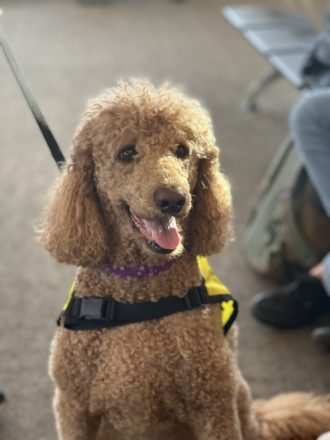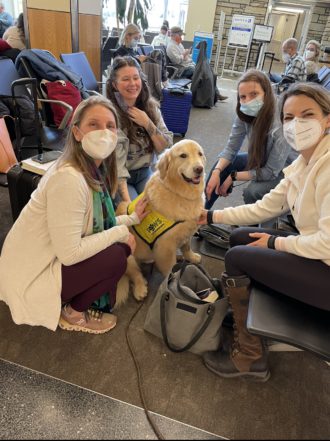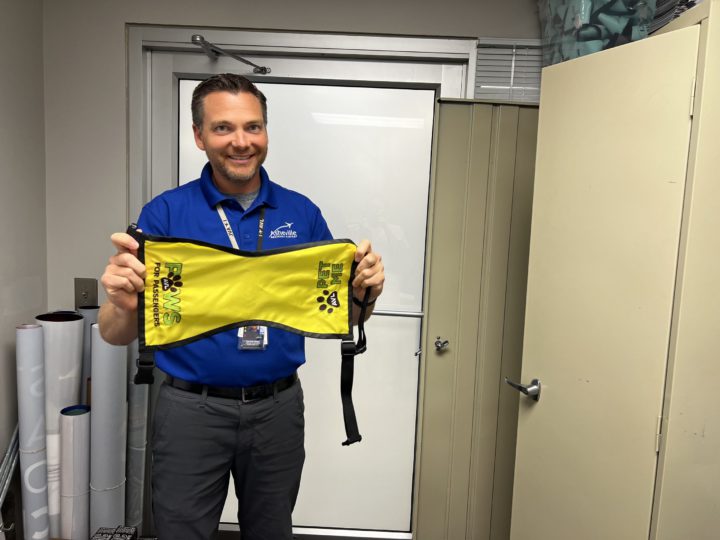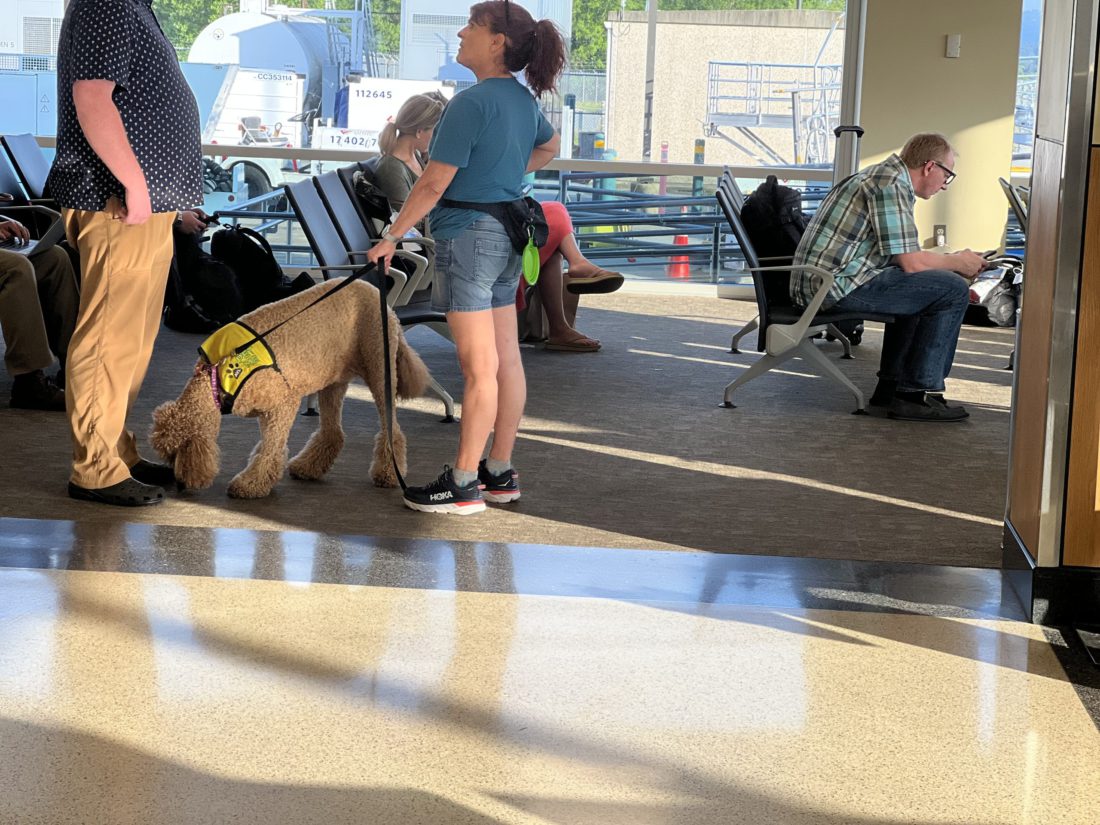By Clarissa Donnelly-DeRoven, North Carolina Health News
Leah Marie and Luna Marie moved to Asheville during the pandemic’s first winter. Luna was 7 years old at the time, and morose. She moped around the house, longing for all her lost social interaction. Luna seemed so sad that Leah thought she might need antidepressants.
But as vaccines rolled out, the two ventured back into the world and Luna got her groove back. Now at 9 years old, Luna — a 60-pound (or so) goldendoodle — is busy as ever. She often goes to work with Leah at a boutique downtown, and she volunteers as a therapy dog: at a memory care center and, more recently, at the Asheville airport.
“She looks like a bomb sniffing dog,” Leah said with a laugh. “She constantly has her nose down,” scouring the floor for scraps that rushed travelers have left behind. But both for canines and for humans, the benefits of therapy dogs extend beyond a crumb here and there.

Research has shown that the presence of therapy dogs in health care facilities can help reduce pain and decrease stress in patients, as well as boost patients’ immune responses. The visit is also beneficial for the dog. Elevated levels of endorphins, oxytocin and dopamine — the happy hormones — have been documented in dogs following their visits.
And in a crowded summer travel season with frequent delays and cancellations, airport therapy dogs could be the trick to reducing some of the stress of traveling.
Benefits extend beyond the hospital
Advocates for therapy dog programs argue that even though most of the research on the dogs has taken place inside health care centers, the benefits don’t stop there. Anywhere there are people who are in distress, a dog might be able to help — and that’s certainly true for airports, places that are notoriously stressful, especially this year as delays and cancellations have mounted.
Pre-pandemic, around 80 airports in the U.S. had a therapy dog program. Most, if not all, suspended operations during the pandemic, and some haven’t started back up again. In North Carolina, only Asheville and Charlotte have airport therapy dogs, though the facilities in New Bern and Greenville said they’d be open to it.
David King led the charge to start the therapy dog program in Asheville. King has worked in the guest services and sales department at the Asheville Regional Airport for about 14 years. Nearly 10 years ago, he found himself at an airport conference and heard a presentation about the therapy dog program at Los Angeles International Airport.
“I thought it was a great idea,” King said. Some people in airports are there for positive reasons, such as a vacation or going to visit a loved one, but others are traveling for sad, painful or stressful reasons — a funeral, leaving home and all the friends and family there.
“There’s so many figures about stress when you’re flying, even if you’re not scared of flying,” he said. “The stress of going through TSA and making your connection, not losing your bag, not leaving something when you go through security, or at the gate.”
Happy dogs, happy passengers
King brought the idea of starting a therapy dog program in Asheville to the airport’s board of directors and other senior leadership. The higher-ups weren’t immediately sold — they worried it could open the airport up to potential liability — but King was persistent.
With good reason. There was tons of research on his side. In addition to reports of reduced pain following a visit from a therapy dog, studies have documented decreases in blood pressure, mood disturbances, and fatigue in patients after a visit from a dog. Studies in nursing homes have found people report feeling less lonely after spending time with the therapy dogs, and research on health care workers and dementia patients showed both groups had lower levels of stress markers in their bodies after an encounter with a therapy dog.
Some scientists also think that simply seeing a friendly, happy dog might help improve people’s mood by activating mirror neurons. These cells are thought to be the part of the brain that helps us learn new tasks and behaviors by watching others — and, it turns out, animals.
One study investigated whether watching an animal do something would activate in research subjects the part of the brain where mirror neurons exist. They found that it did.
Dawn Marcus, a neurology and anesthesiology professor at the University of Pittsburgh, wrote about the findings in her 2013 review of the research on animal-assisted therapy. “This study supports the hypothesis that humans witnessing “cheerful” behavior in a friendly dog (such as attentiveness to the subject, mouth slightly open and ‘smiling,’ and tail wagging) might result in empathic imitation of cheerful behavior, possibly mediated by activation of mirror neurons,” she wrote.

Also, because of dogs’ incredible sense of smell, some studies have suggested that their noses can lead them to the sickest or most stressed member in a group — perhaps the person who needs their help the most.
King knew travelers and workers in airports were stressed. If there was an easy (and free) way to decrease that stress, shouldn’t they try it?
By July 2017, the airport leadership had been swayed. The program grew over the next three years. Before the COVID-19 pandemic hit, 25 therapy dogs and handlers (the dog’s owners) participated in the program. Every July they’d set up an anniversary party for the program and pass out “PAWS for Passengers” branded tennis balls, bandanas, stickers and portable water bowls. On Valentine’s Day, they set up a doggy kissing booth: Smooches from Pooches.
All that ended during the pandemic. The program resumed in October 2021, but the number of participating dogs and owners decreased to 15.
Are you a good girl?
All therapy dogs must be well trained and certified through a reputable therapy dog program. Most of the Asheville dogs get theirs through the Alliance of Therapy Dogs. Unlike service dogs, there isn’t a formal training program that therapy dogs complete.
Leah, Luna’s owner, argues that a dog’s temperament is the best indicator of whether or not they’re fit to be a therapy dog. “If you have a jumping, barking, hyper dog, you’re not going to be able to change them,” she said. “They have to have the temperament and also be confident enough — bold enough — to walk up to strangers and not be timid.”

That’s certainly Luna’s demeanor. She walks around with a permanent smile, and accepts pats on the head and back without reservation. Leah’s had her since she was a teeny puppy, and she’s been through basic obedience training, as well as some therapy dog extras such as not licking or jumping up on people.
“From the time I brought her home, anywhere we’d go I’d put her in the grocery cart and push her around,” she said. “I didn’t always tell kids ‘Oh, don’t do that, don’t do that’ — unless they were really hurting her — so that she would be used to things.”
‘Pet me’
Volunteering at the airport predictably entails a higher level of scrutiny than volunteering at other locations. Prospective participants are fingerprinted and undergo background checks before they can be approved. The airport also prefers that the dogs have some therapy experience beforehand.
Once they’re approved, they have an interview with King where he asks the owner some questions and sees how the dog responds to all the people and loud noises in the building.
Also, he needs to see how they feel about the tile floors. “We had one dog that was terrified of the terrazzo floor and the gloss and just wouldn’t walk on it,” King said.
If it does seem like a good fit, then they’re off. The volunteers get a badge that allows them to go through security and baseball cards with their dog’s face and name. The dog gets a vest that says “pet me.”
Stressed-out passengers can be outright cruel to airport staff, so Leah tries to make sure she gets to the airport early enough that Luna has time to greet them.
“The janitors, the people behind the customer service desk at the airline, air ticketing. I go into the gift shops,” she said. “I really pay attention to them because especially these days, they’re stressed.”
This article first appeared on North Carolina Health News and is republished here under a Creative Commons license.![]()




As the “Church Lady” (aka Dana Carvey) said: “Isn’t that special!”